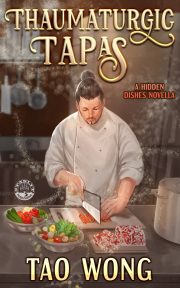The Revolution Will Be Fantasized
by Samuel Poots
Editor’s note: This piece is part of a rolling series, Writing from History, in which creators share professional insights related to the work of using historical elements in fictional prose.
In 2009, I met my hero. I was eighteen, painted blue, and wearing a borrowed kilt, a brave choice for November in Ireland. At the other end of a line of eager fans sat a man with a white beard and black hat. Terry Pratchett’s work had gotten me through plenty of hard times, and I had already decided to become a writer, like he was. So, when my time came to hand over Folklore of the Discworld for signing, I asked The Question. The question all budding writers ask their literary idols.
Got any tips?
You can watch the moment here; some kind soul uploaded it so the world can see me standing half-naked before my favorite author. I came away in a star-struck daze, but two pieces of advice stuck with me:
- Read history like crazy.
- Avoid other new writers; they don’t know enough to help you yet.
The second point did not work for me, but the first I took to heart. Soon, I was stumbling into historical moments in almost every fantasy work I read. In Pratchett’s Night Watch alone, we encounter the Peterloo Massacre, the June Rebellion, and the Battle of Cable Street (that last one’s in name only)—all recontextualised to fit Ankh-Morpork’s grimy streets.
When writing fantasy, authors often look to history. Sometimes, it even provides a script to follow. For example, R.F. Kuang’s The Poppy War follows 21st-century Chinese history through its fantasy world. Such practices often lead critics to dismiss fantasy as “backwards-looking.” And this is true. We love diving into imagined pasts, histories that never were, timelines that dance back and forth across reality’s rails. It is also true this has trended toward the conservative. “Righteous” monarchies, good wars, nostalgia-infused depictions of a homogenous European history are considered genre hallmarks. However, far from making fantasy inherently conservative, this drawing from history can be the genre’s greatest radical strength.
In 1998, Dianna Wynne Jones’s Dark Lord of Derkholm flipped Eurocentric fantasy on its head. Suddenly, all those familiar tropes became subject to colonialism, their resources and culture subsumed to the desires of tourist parties made up of wealthy fantasy fans. Jones took colonial history’s script and applied it to the fantasy worlds it had itself helped spawn, showing her Western audience their place within it.
In An Introduction to Fantasy, Matthew Sangster describes fantasy as being self-consciously iterative, building upon the histories and folk traditions it grew from. The genre is “obsessed” with the past, re-imagining it to find new outcomes. Doing so often reveals gaps in the histories, places where people—queer people, women, people faced with colonization and racial oppression—had their stories overlooked and suppressed. Stories like The Traitor Baru Cormorant, The Unbroken, and Fireheart Tiger hold a post-colonial, queer lens to the history of empire. By focusing on these overlooked histories, writers tap into the true revolutionary potential of fantasy’s obsession with the past.
Yet fantasy is not alone in this obsession. According to historians Keith Michael Baker and Dan Edelstein, those who dismiss fantasy as conservative may be surprised to find referencing the past is a hallmark of another project: revolution.
Revolutions are extremely self-conscious of how previous revolutions unfolded. These revolutionary scripts offer frameworks for political action. Whether they serve as models or counterexamples, they provide the outlines on which revolutionary actors can improvise. And revolutionaries, in turn, can transform the scripts they inherit. (Baker and Edelstein, Scripting Revolutions, Stanford University Press, 2015, p. 2)
In much the same way a fantasy author may look to the past to imagine new outcomes, revolutionaries define themselves in response to previous revolutions. This in turn fits with fantasy’s love of building layered histories and folk traditions for its characters to navigate, so it’s unsurprising to find many modern fantasy stories centering on revolution.
There can be a sense of wish fulfillment here, a wistful “If only…” we may feel when looking back at history. Revolutions take that sentiment and use it to evoke action, whereas fantasy takes history’s script and uses it to analyze the present it led us to. We are seeing fantasy’s revolutionary potential in more than just imaginary spaces.
2020 was a difficult year. The pandemic was in full swing, leaving us to gaze out through the portholes of our screens. What we saw was terrifying. Fear. Panic. Military uprisings. Anti-vaccine extremists. And, in the midst of it all, George Floyd was killed by the Minneapolis police. As protests met with police brutality, quotes started appearing across social media. Quotes from Terry Pratchett’s Night Watch. Pratchett biographer Mark Burrows noted, “It was hard to watch the riots and protests…and not think of this book.” (The Novels of Sir Terry Pratchett, 2020). As people watched injustices unfold, some turned to Pratchett’s words to voice their outrage, using fantasy to explain reality.
Pratchett is far from the only author whose work is used in such a way. Earlier that same year, Thai protesters used The Hunger Games’s three-fingered salute, which Thailand had banned in 2014. The salute appeared again in Myanmar, as protestors marched against the 2021 military coup d’etat. Even Tolkien, perhaps the greatest example of apparently conservative fantasy, inspired the 1970s counter-culture slogan “Frodo Lives.”
Fantasy, revolutionary activity, and history form three spokes in a wheel. More fantasy writers are focusing their stories on revolution. More people turn to the fantastic to express their experiences with social upheaval. Reality and narrative intertwine, each one shaping the other.
I believe this is something writers are really starting to grapple with. Revolution stories are now rarely about one plucky farm boy and his sidekicks taking down the dark lord. Premee Mohamed’s Siege of Burning Grass dives into the struggle between the individual and the movement; Fonda Lee’s Green Bone Saga explores the generational impact of a post-revolution society; China Miéville’s Iron Council shouts its class struggles to the rooftops. Fantasy’s mirror is set firmly before real-world revolution. As each reflects upon the other, we find in that glass new ways to understand ourselves and the histories we shape.
 Samuel Poots is a Creative Writing PhD researcher who communicates primarily through Pratchett quotes, and writer-in-residence at Ulster University. A writer of both fiction and tabletop games, his work has appeared in Dark Matter Magazine, Cast of Wonders, Warhammer Fantasy Roleplay, and Jim Henson’s Labyrinth: The Adventure Game, among others. When not writing or procrastinating, he can usually be seen wandering the Antrim coast muttering about dragons. If found, please give him a cup of tea and send him home via the nearest post office. Follow Sam across social media as @pootsidoodle.
Samuel Poots is a Creative Writing PhD researcher who communicates primarily through Pratchett quotes, and writer-in-residence at Ulster University. A writer of both fiction and tabletop games, his work has appeared in Dark Matter Magazine, Cast of Wonders, Warhammer Fantasy Roleplay, and Jim Henson’s Labyrinth: The Adventure Game, among others. When not writing or procrastinating, he can usually be seen wandering the Antrim coast muttering about dragons. If found, please give him a cup of tea and send him home via the nearest post office. Follow Sam across social media as @pootsidoodle.



